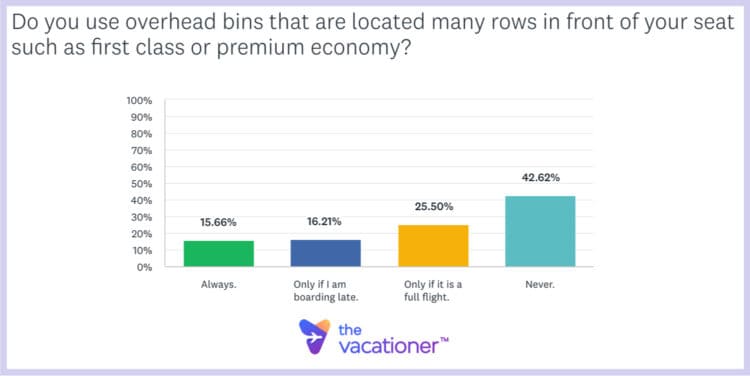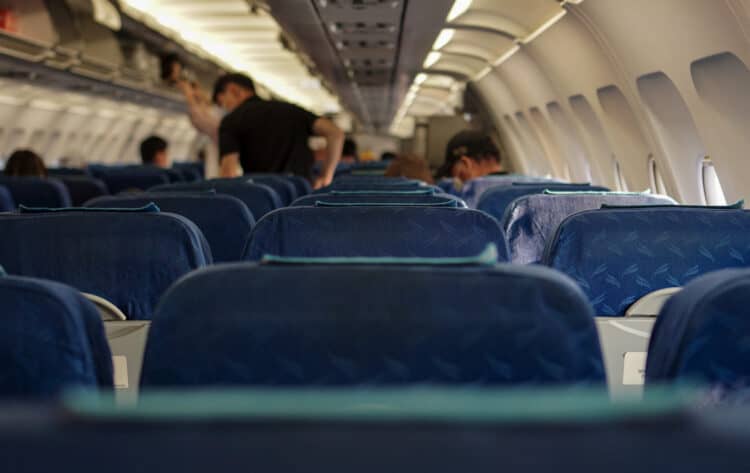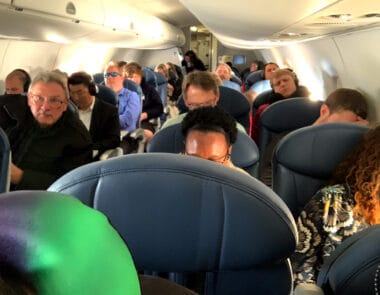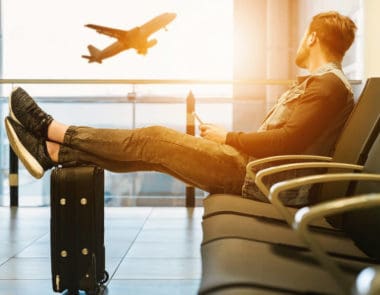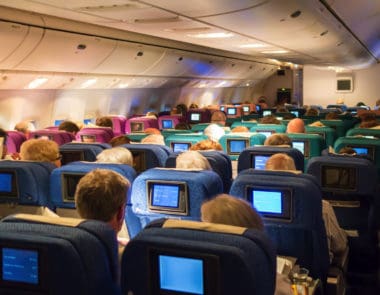Overhead Bin Space Rules, Etiquette, & Survey Data – Who Does it Belong To and How to Avoid Fights (2025)
Have you ever wondered why so many people crowd the gate before boarding an airplane? Unfortunately, it is due to limited overhead bin space. Everybody wants to store their bag near their seat, and no one wants to gate check it. That has caused a fierce battle among passengers before boarding, which adds more anxiety to an already stressful flying experience.
This article will detail proper overhead bin space etiquette. Additionally, it will provide tips on how to access the overhead bins earlier.
Table of Contents
What Caused the Overhead Bin Space Issue?
Airlines began charging for checked bags in 2008. Before that, overhead bin space was fairly abundant, and people were not lining up to get on the plane as early as possible.
After implementing checked bag fees, it became cheaper to carry on your luggage. While it is changing, most planes still do not have enough overhead bin space for every passenger to store a bag. Essentially, airlines created the problem, but they are working to fix it with larger overhead bins.
Why Do People Fight for Overhead Bin Space?
Even if the plane runs out of overhead bin space, your airline will gate check your bag for free. So why do people still line up at the gate early and fight for space? Here are the two main reasons.
- Gate checking your bag is often inconvenient.
- Having to use a bin behind your seat slows down deplaning.
Having to gate check your bag is incredibly annoying. Instead of being able to quickly retrieve your bag and get off the plane, you now have to go to the luggage carrousel after deplaning. Not only does it take time, it may cause you to miss a tight connection. Rarely, the airline has given me back my gate-checked bag at the gate after landing, but that is not the norm.
Additionally, getting on the plane late may mean the bins near your seat are already full. That forces you to store your bag in a bin many rows behind your seat. Unfortunately, overhead bin space is community space; The bins above your seat do not belong to you.
Recent Survey on Overhead Bin Space
The Vacationer’s Eric Jones recently conducted a survey on overhead bin space etiquette. Here is the question:
Do you use overhead bins that are located many rows in front of your seat such as first class or premium economy?
Here are the results.
- Always. — 15.66%
- Only if I am boarding late. — 16.21%
- Only if it is a full flight. — 25.50%
- Never. — 42.62%
Most people are more than willing to use overhead bins many rows in front of their seats. While I consider it acceptable after everyone has boarded, I disagree with always doing it.
Overhead Bin Space Etiquette
Here are my tips when it comes to overhead bin space etiquette. While these are not hard rules, I believe they would lead to a more efficient and fair boarding process.
Overhead Bin Space is Community Space, But Use a Bin Near Your Seat
Unfortunately, the overhead bin above your seat does not belong to you. Airlines consider overhead bin space to be community space, which means every bin in a particular cabin is fair game. Regardless, I recommend following these guidelines.
- Do not drop your bag off in the first available bin in your cabin
- Use the available bin closest to your seat
- Place your bag on its side in the bin if required by the airline
Dropping your bag off in the first available bin is rude and slows down deplaning for everyone. While you can technically use it, it makes more sense to save it for a passenger sitting toward the front of the plane. Otherwise, those sitting towards the front of the plane have to store their bag in a bin behind their seat, which means everyone may be waiting longer to get off the plane.
Instead, store your bag in a bin close to your seat. Ideally, the bin above your seat is open but opt for a bin slightly in front of your row if it is not. Only choose a bin behind your seat if there are no other options.
Do Not Put Your Bag in Another Cabin (such as First Class) or the Bulkhead Row Until Everyone Has Boarded
If you are in the main cabin, store your bag in the main cabin. Do not store your bag in other cabins such as first class or premium economy.
Many airlines use a plaque to mark bins in first class and premium economy for those passengers only. In many cases, those sitting in those cabins paid extra for their seats, which also includes dedicated overhead bin space for their cabin only. While flight attendants may not strongly enforce it, you should only use overhead bins in your cabin.
Additionally, do not store your bag in the bins above bulkhead seats even if they are in your cabin. Those seats generally do not have space for you to store your personal item on the floor because there is not a seat in front of them. Passengers sitting in bulkhead seats often have to store both their carry-on and personal item in the overhead bin, so they need the extra space.
The only exception to this rule is if everyone has boarded and there is additional bin space left in first class, premium economy, and the bulkhead row.
Avoid a Fight – Do Not Move Another Passenger’s Bag
Do not move another passenger’s bag or other personal item from the overhead bins. While you may have to slightly adjust another bag, do not remove it from the bin or place it in a different bin. If it is supposed to be on its side but is flat, I do not see a problem with flipping it on its side.
The Vacationer Tip
If you feel like someone is using the wrong bin (such as a coach passenger using first class bins) or has items in the bin that do not belong, alert a flight attendant. Airplane fights are often caused by disputes over overhead bin space — moving someone else’s bag only increases the odds of an altercation.
Do Not Use the Overhead Bin Space for Personal Items/Jackets
Unless you are seated in the bulkhead row, you should not store personal items in the overhead bin. Personal items go under the seat in front of you, and putting them in the overhead bin takes space away from other passengers with a carry-on.
It is especially important not to just throw your jacket in the overhead bin. Many people simply toss their jackets in the bin, which can often take up enough space for two carry-ons.
If after everybody boards and there is still space, only then should you consider storing your backpack or other personal item in an overhead bin.
Further Reading: Best Carry-On Suitcase Luggage Bags
Properly Place Your Suitcase on Its Side if Required
Many airlines now instruct passengers to place their carry-on bags on their side before storing them in the overhead bin. This is the most efficient way to store bags on many planes and allows more bags to be stored.
Despite graphics and instructions inside the bin, I have witnessed many people not turning their bags on its side. Storing your bag like this takes away valuable space from other passengers. It takes very little additional time and energy to turn your bag on its side, so you should always do it if required.
Offer to Help Struggling Passengers, But Do Not Be Forceful
You should politely ask passengers struggling with their bags if they need assistance in getting them into or down from an overhead bin. Some people will gladly accept the help, while others prefer to do it on their own.
Do not just grab someone else’s bag. The only exception is if someone is actively going to drop their bag or injure themselves or another person.
How to Avoid the Overhead Bin Space Battle
Here are ways to avoid the overhead bin space battle altogether.
Check Your Bag
Checking your bag is the only way to completely avoid the stress of the overhead bin space battle. Many people do not check bags for the following reasons, however.
- It is often more expensive than bringing a carry-on only.
- Checked bag drop lines may be long.
- The airline may lose your checked luggage.
- It takes time to retrieve your checked bags after landing.
Those reasons are enough to steer me away from checking a bag unless I absolutely have to. While I do not find the overhead bin space battle fun, it is much better than wasting time and potentially losing my bag.
Further Reading: What Should I Do If My Luggage is Delayed, Lost or Damaged by My Airline?
Board in Early Groups Through Your Ticket, Credit Card, or Airline Status
Boarding early almost guarantees access to an overhead bin near your seat. Here are the top ways to get an early boarding group.
- Have a First Class, Business Class, or Premium Economy Ticket
- Hold an airline credit card with priority or preferred boarding privileges
- Hold airline status with priority or preferred boarding privileges
First class, business class, and premium economy tickets almost always board before those sitting in standard economy (exceptions include those in a wheelchair, active military, and families with small children). If your ticket entitles you to board early, you should take full advantage if overhead bin space is a concern.
Many travel credit cards and airline credit cards include priority and preferred boarding privileges. Most of these cards have an annual fee, so be sure to read the other benefits before signing up. One such example is the Citi® / AAdvantage® Executive World Elite Mastercard® ($595 annual fee), which includes Group 4 boarding for American Airlines passengers.
Finally, holding airline status often includes priority boarding as a benefit. I currently hold American Airlines AAdvantage Gold®, and it entitles me to Group 4 priority boarding. That is almost always early enough for me to find bin space above my seat, so I take full advantage and board when Group 4 is called.
Book a Seat with Dedicated Overhead Bin Space
Many airlines have dedicated overhead bin space for passengers sitting in first class, business class, and premium economy. While it varies by airline, you will typically find a plaque on the overhead bin designating it for passengers in that cabin.
Having a seat with dedicated overhead bin space betters your odds of avoiding the chaos, but it does not prevent it. Some people do not know or care those bins are reserved for passengers in those sections and use them anyway. Many flight attendants do not enforce the rule, so it works on an honor system.
Do Not Board Last
Boarding last puts you at risk of either having to gate check your bag or store it in a row behind your seat. That is true even for first class passengers who may lose their space due to a coach passenger using the wrong bins.
I recommend boarding when your group is called. Unfortunately, that means lining up early at times, but it is necessary to give yourself the best odds of securing overhead bin space near your seat.
While you may get lucky if you board last, I do not recommend taking the risk on a full flight.
FAQs
It does not. Unfortunately, overhead bin space is community space for a particular cabin.
You should not, but flight attendants do not often police it. I recommend only using first-class bins if everyone in first class has already boarded and stored their luggage.
Here are a few ways to get an earlier boarding group:
– Buy a first class, business class, or premium economy ticket.
– Use a credit card with priority or preferred boarding access.
– Hold airline status with early boarding privileges.
It depends. I have seen flight attendants block first class and premium economy bins for those sitting in the rows. I have also seen flight attendants scold those who used a bin towards the front of the plane despite their seats being in the back.
The Vacationer’s Final Thoughts
Flying is already stressful enough. Do not get caught up in the battle for overhead bin space. Board early with a premium ticket, select credit card, or airline status. Remember the bin above your seat does not belong to you because it is community space. If your bin is taken, search for an open bin slightly in front of your seat to avoid delaying deplaning. Finally, consider checking a bag to avoid the battle altogether.
Further Reading:
- Airplane Etiquette Rules
- Airplane Seat Reclining Etiquette – Is it Rude or is it Your Right?
- Airplane Seat Switch Etiquette — Can You (and Should You) Change Seats With Someone Else on a Flight?
- Best Airline Credit Cards
- Best Seats on a Plane
- Controversial Airplane Behavior Survey
- Tips to Reduce Air Travel Stress, Fear, & Anxiety to Better Your Flight Experience
- Worst Seats on a Plane
Get The Vacationer Newsletter
Get highlights of the most important news delivered to your email inbox

